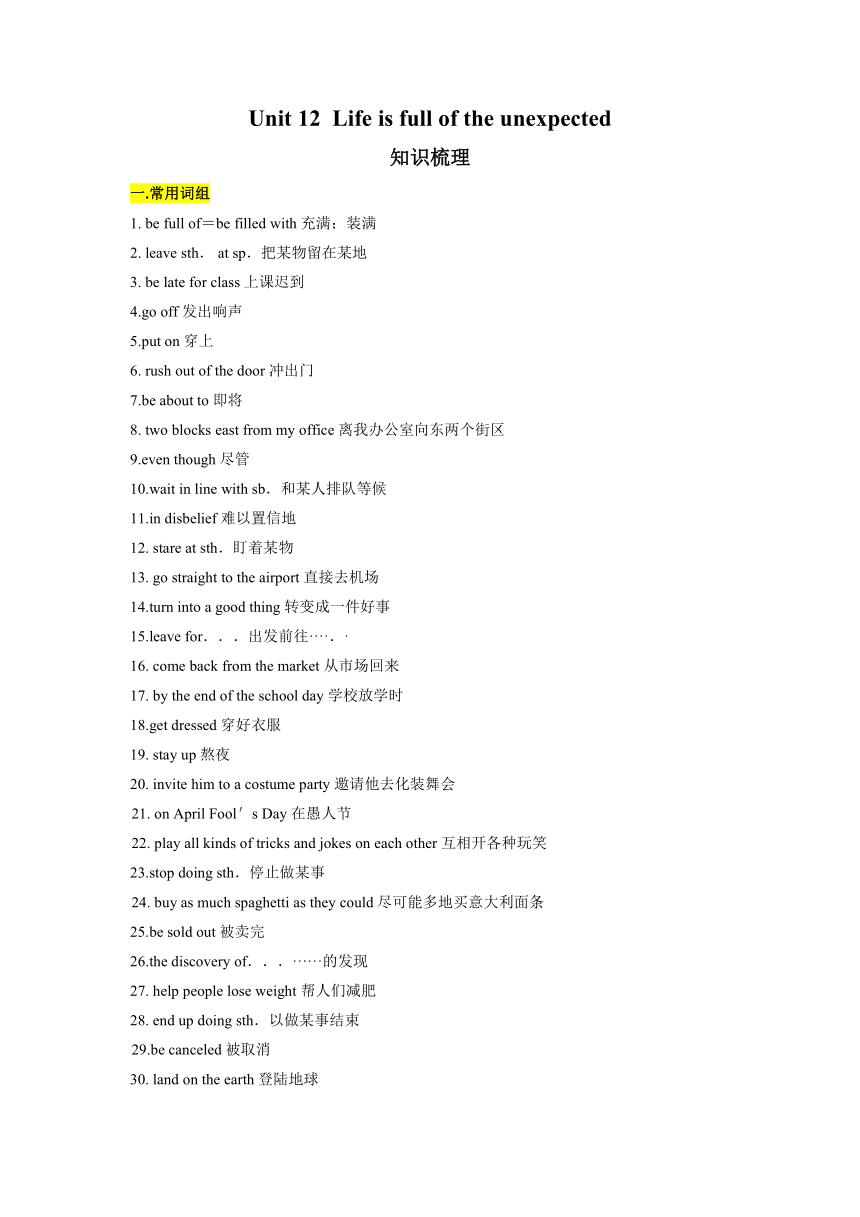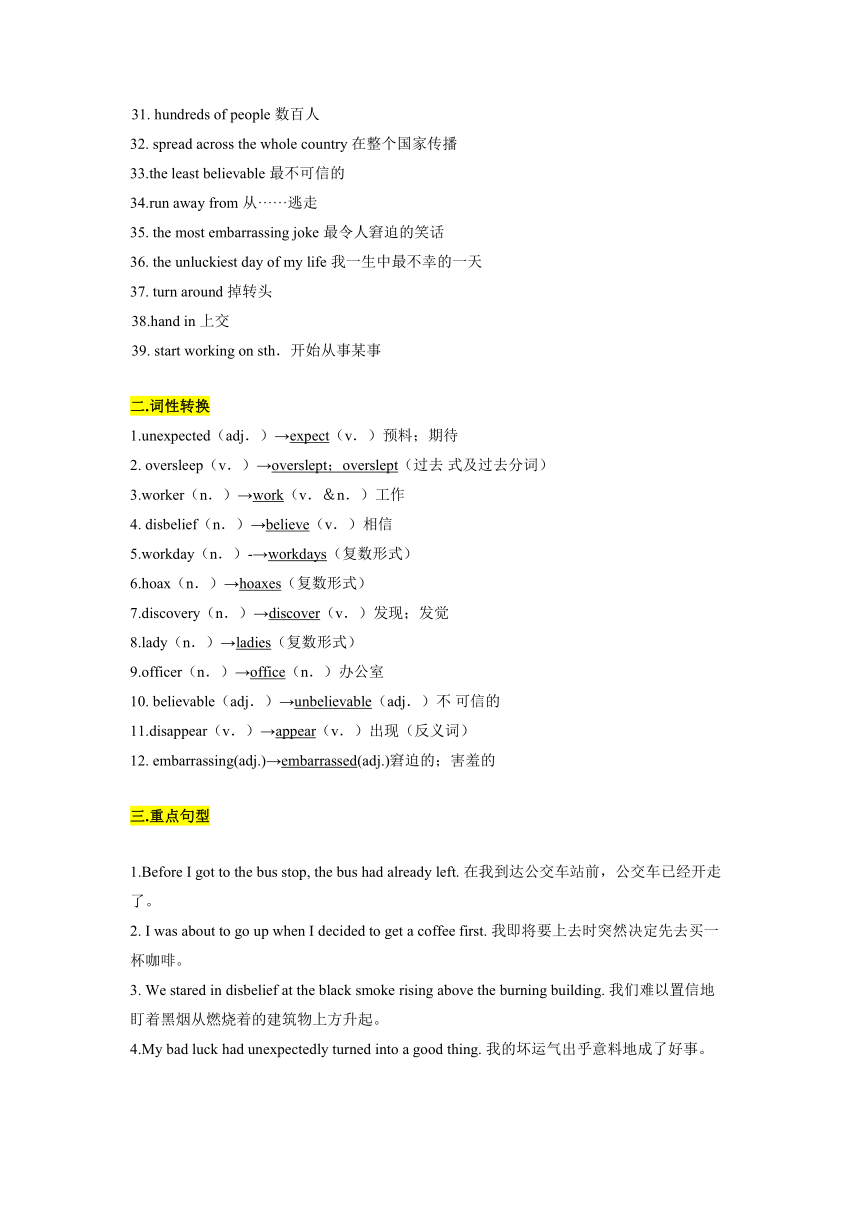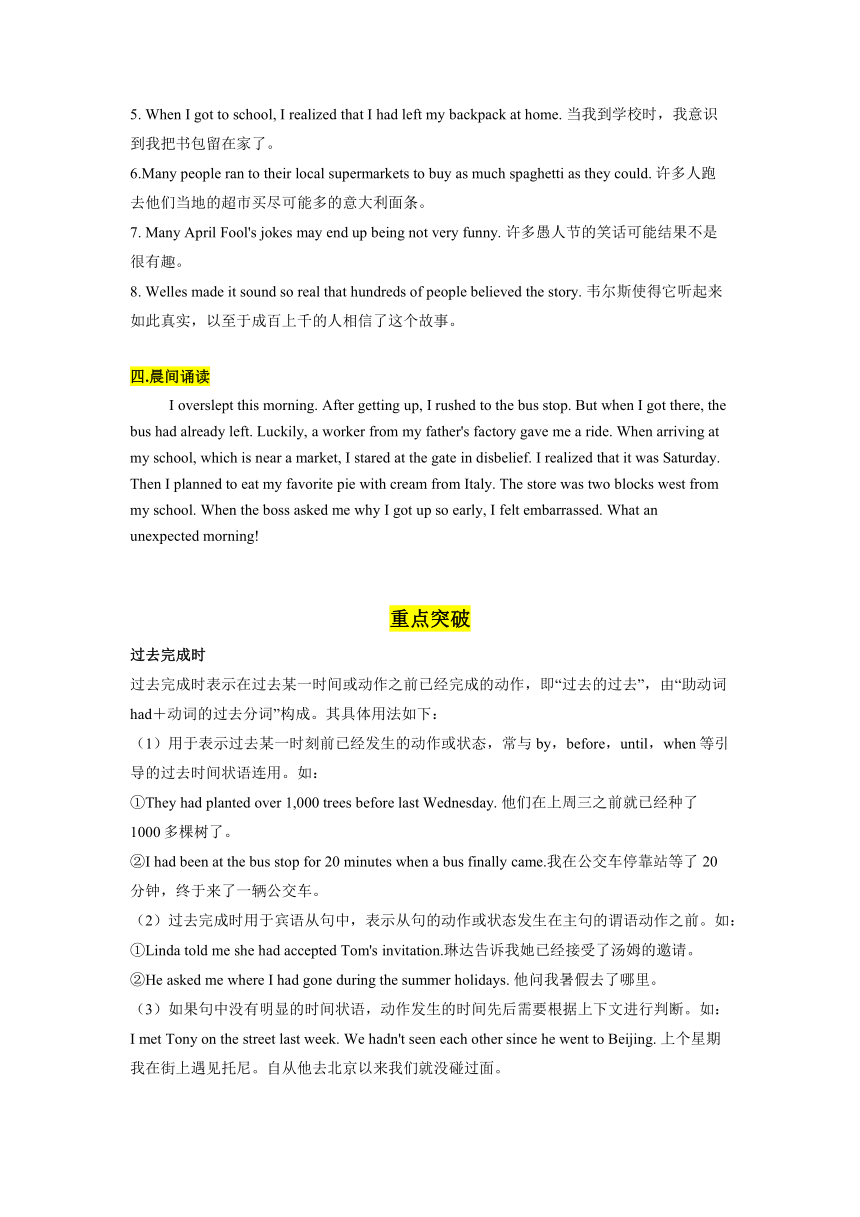Unit 12 Life is full of the unexpected.核心短语句型考点练习题与讲义
文档属性
| 名称 | Unit 12 Life is full of the unexpected.核心短语句型考点练习题与讲义 |

|
|
| 格式 | docx | ||
| 文件大小 | 27.5KB | ||
| 资源类型 | 教案 | ||
| 版本资源 | 人教新目标(Go for it)版 | ||
| 科目 | 英语 | ||
| 更新时间 | 2022-03-24 00:00:00 | ||
图片预览



文档简介
Unit 12 Life is full of the unexpected
知识梳理
一.常用词组
1. be full of=be filled with 充满;装满
2. leave sth. at sp.把某物留在某地
3. be late for class 上课迟到
4.go off 发出响声
5.put on 穿上
6. rush out of the door 冲出门
7.be about to 即将
8. two blocks east from my office 离我办公室向东两个街区
9.even though 尽管
10.wait in line with sb.和某人排队等候
11.in disbelief 难以置信地
12. stare at sth.盯着某物
13. go straight to the airport 直接去机场
14.turn into a good thing 转变成一件好事
15.leave for...出发前往····.·
e back from the market 从市场回来
17. by the end of the school day 学校放学时
18.get dressed 穿好衣服
19. stay up 熬夜
20. invite him to a costume party 邀请他去化装舞会
21. on April Fool's Day 在愚人节
22. play all kinds of tricks and jokes on each other 互相开各种玩笑
23.stop doing sth.停止做某事
24. buy as much spaghetti as they could 尽可能多地买意大利面条
25.be sold out 被卖完
26.the discovery of...······的发现
27. help people lose weight 帮人们减肥
28. end up doing sth.以做某事结束
29.be canceled 被取消
30. land on the earth 登陆地球
31. hundreds of people 数百人
32. spread across the whole country 在整个国家传播
33.the least believable 最不可信的
34.run away from 从······逃走
35. the most embarrassing joke 最令人窘迫的笑话
36. the unluckiest day of my life 我一生中最不幸的一天
37. turn around 掉转头
38.hand in 上交
39. start working on sth.开始从事某事
二.词性转换
1.unexpected(adj.)→expect(v.)预料;期待
2. oversleep(v.)→overslept;overslept(过去 式及过去分词)
3.worker(n.)→work(v.&n.)工作
4. disbelief(n.)→believe(v.)相信
5.workday(n.)-→workdays(复数形式)
6.hoax(n.)→hoaxes(复数形式)
7.discovery(n.)→discover(v.)发现;发觉
8.lady(n.)→ladies(复数形式)
9.officer(n.)→office(n.)办公室
10. believable(adj.)→unbelievable(adj.)不 可信的
11.disappear(v.)→appear(v.)出现(反义词)
12. embarrassing(adj.)→embarrassed(adj.)窘迫的;害羞的
三.重点句型
1.Before I got to the bus stop, the bus had already left. 在我到达公交车站前,公交车已经开走了。
2. I was about to go up when I decided to get a coffee first. 我即将要上去时突然决定先去买一杯咖啡。
3. We stared in disbelief at the black smoke rising above the burning building. 我们难以置信地盯着黑烟从燃烧着的建筑物上方升起。
4.My bad luck had unexpectedly turned into a good thing. 我的坏运气出乎意料地成了好事。
5. When I got to school, I realized that I had left my backpack at home. 当我到学校时,我意识到我把书包留在家了。
6.Many people ran to their local supermarkets to buy as much spaghetti as they could. 许多人跑去他们当地的超市买尽可能多的意大利面条。
7. Many April Fool's jokes may end up being not very funny. 许多愚人节的笑话可能结果不是很有趣。
8. Welles made it sound so real that hundreds of people believed the story. 韦尔斯使得它听起来如此真实,以至于成百上千的人相信了这个故事。
四.晨间诵读
I overslept this morning. After getting up, I rushed to the bus stop. But when I got there, the bus had already left. Luckily, a worker from my father's factory gave me a ride. When arriving at my school, which is near a market, I stared at the gate in disbelief. I realized that it was Saturday. Then I planned to eat my favorite pie with cream from Italy. The store was two blocks west from my school. When the boss asked me why I got up so early, I felt embarrassed. What an unexpected morning!
重点突破
过去完成时
过去完成时表示在过去某一时间或动作之前已经完成的动作,即“过去的过去”,由“助动词had+动词的过去分词”构成。其具体用法如下:
(1)用于表示过去某一时刻前已经发生的动作或状态,常与by,before,until,when等引导的过去时间状语连用。如:
①They had planted over 1,000 trees before last Wednesday. 他们在上周三之前就已经种了1000多棵树了。
②I had been at the bus stop for 20 minutes when a bus finally came.我在公交车停靠站等了20分钟,终于来了一辆公交车。
(2)过去完成时用于宾语从句中,表示从句的动作或状态发生在主句的谓语动作之前。如:
①Linda told me she had accepted Tom's invitation.琳达告诉我她已经接受了汤姆的邀请。
②He asked me where I had gone during the summer holidays. 他问我暑假去了哪里。
(3)如果句中没有明显的时间状语,动作发生的时间先后需要根据上下文进行判断。如:
I met Tony on the street last week. We hadn't seen each other since he went to Beijing. 上个星期我在街上遇见托尼。自从他去北京以来我们就没碰过面。
易混辨析
1.above,on与over
(1)above作副词,意为“在较高处;在头顶上方”;above作介词,意为“高于;在······之上”,表示在数量、水平、年龄等方面超过;above还可作形容词,意为“前文述及的;上述的”。
(2)on,over,above都可表示“在······的上面”,但侧重点不同:on指与另一物有所接触;over指在某物的正上方或覆盖某物;above指在某物的上方,但不一定在正上方。如:
①There are some books on the shelf.书架上有一些书。
②Apartment 46 was a quiet apartment, unlike the one above it. 和它楼上的那间不同,46号公寓很安静。
③The quilt is over the bed.被子在床上。(侧重被子是铺在床上,把床覆盖了)
④The ceiling fan is over the table.吊扇在桌子上方。(侧重指在桌子正上方)
⑤The ceiling fan is above the table.吊扇在桌子上方。(这时侧重指吊扇在桌子上面的任意一个区域)
2.alive,live与lively
(1)alive 主要用作表语(有时可用作后置定语,但不用作前置定语)。如:
He must still be alive.他一定还活着。
(2)live作形容词时,通常只用作定语(前置),可用于动物或植物,但一般不用于人,还指“实况转播的”,当然,live还可作动词,意为“居住”。如:
①He bought some live fish.他买了几条活鱼。
②It wasn’t a recorded show; it was live.这不是录音表演,这是现场转播。
③He lived with his grandparents during his childhood.他童年期间和他的爷爷奶奶住。
(3)lively则意为“活泼的;活跃的;充满生气的”,可作定语、表语或宾语补足语,既可指人,又可指物。如:
Jenny is a lively girl.珍妮是个活泼的女孩。
3.embarrass,embarrassed 与embarrassing
(1)embarrass是及物动词,意为“使困窘;使局促不安”。如:
He didn't want to embarrass her by asking questions.他不想因提问而使她难堪。
(2)embarrassed是形容词,意为“窘迫的;害羞的”,常用于描述人,通常作表语。如:
①She looks very embarrassed.她显得很尴尬。
②She was embarrassed when they asked her age.他们问她年龄时,她很窘迫。
(3)embarrassing 也是形容词,常用于描述事物,作定语或表语,意为“使人难堪的”。如:
He laughed off the embarrassing situation.他以笑来解除这种尴尬的处境。
能力提升
趁热打铁
一、选词填空
Above over on
1.There is a computer________ the desk.
2.There is a bridge________ the river.
3.The plane is flying________ the clouds.
4.Please write to us at the ________ address.
5.Look at the clear blue sky________! What nice weather!
二、用方框中所给词语的适当形式填空
Live alive lively
1.He is the only man________ in the accident.
2.There are some________ fish in this small river.
3.Beijing is one of the________ cities in the world.
4. He didn't tell me where he________.
三、用embarrass的适当形式填空
It was such an________ situation that everyone felt really
四、根据汉语意思,完成英语句子,每空词数不限
1.在搬进去之前,我们已经把房子打扫过了。
________ ________ ________ ________ ________ before we moved in.
2.昨天我父母到家的时候,我已经为他们做好了晚饭。
By the time my parents got home yesterday, ________________________________.
3.迈克说他已经把那本书还给图书馆了。
Mike said that________________________________.
综合训练
一、用方框中所给词语的适当形式填空,每调仅用一次
ring believe oversleep announce expect
1.-Bob,what happened to you
-I________ and I was late for school.
2. All the students had arrived when the teacher________ the bell.
3. Police officers must be fully prepared for the________.
4. Just now the speaker from the government________ that the railway was going to be closed.
5. Her explanation certainly sounded________ . We all thought it was true.
二、根据句意及汉语提示完成句子
1.They have________(取消) today's travel plan because of the rainstorm.
2.The sun________(消失)behind the clouds and the wind became stronger.
3.Susan was________(愚弄) into believing her brother's promise.
4.Everyone was excited about the________(发现) of frozen water on the moon.
5.The two________(女士)usually talk about their children in the evening.
三、根据句意及首字母提示完成句子
1. To avoid missing the plane, I hurried to the a________ after packing clothes.
2.Lisa went to the m________ to buy something for dinner with her grandma.
3. The police stopped the man and then found a gun in his b________.
4. My brother agreed to give me al________ to the science fair this afternoon.
5. The firemen tried their best to save more lives from the b________ building.
四、语法填空
阅读下面短文,在空白处填人一个适当的词,或填入括号中所给单词的正确形式。
As we all know, people play jokes on others on April Fool's Day. Sometimes, they use some joke tools. Soren Sorensen Adams was an inventor of such tools.
Born in Denmark in 1879, Adams moved to the US with his family at age four and 1________ (grow) up in Perth Amboy, New Jersey. In 1904, Adams worked as a salesman for a dye(染料)company. One of the 2
________(product) he sold caused people to sneeze(打喷嚏),and then Adams used it to create a new product 3________ (call) Cachoo. He sold it as a tool 4________ people could use to play jokes on others. Cachoo achieved national 5________ (popular) in a short time. More and more people began to ask him for this product. So he decided 6________ (start)the Cachoo Sneezing Powder Company.
To make his company more popular, Adams went on 7________ (invent) many other amazing tools. In 1928,Adams invented the Joy Buzzer which could 8________ (put) in one hand. People used it when shaking hands with others, When shaking hands, they would feel the 9________(expect)vibrations(振动)from the Joy Buzzer. Adams continued to lead his company 10________ his death in 1963. He was widely known as “King of the Pranksters(恶 作剧者)”.
答案
【趁热打铁】
一、1.on 2.over 3.above 4.above 5.above
二、1.alive 2.live 3.liveliest 4.lived
三、embarrassing,embarrassed
四、1.We had cleaned the house
2.I had made dinner for them
3.he had returned the book to the library
【综合训练】
一、1.overslept 2.rang 3.unexpected 4.announced 5.believable
二、1.canceled 2.disappeared 3.fooled 4.discovery 5.ladies
三、1.airport 2.market 3.backpack 4.lift 5.burning
四、1.grew 2.products 3.called 4.that/which 5.popularity
6.to start 7.inventing 8.be put 9.unexpected 10.till/until
知识梳理
一.常用词组
1. be full of=be filled with 充满;装满
2. leave sth. at sp.把某物留在某地
3. be late for class 上课迟到
4.go off 发出响声
5.put on 穿上
6. rush out of the door 冲出门
7.be about to 即将
8. two blocks east from my office 离我办公室向东两个街区
9.even though 尽管
10.wait in line with sb.和某人排队等候
11.in disbelief 难以置信地
12. stare at sth.盯着某物
13. go straight to the airport 直接去机场
14.turn into a good thing 转变成一件好事
15.leave for...出发前往····.·
e back from the market 从市场回来
17. by the end of the school day 学校放学时
18.get dressed 穿好衣服
19. stay up 熬夜
20. invite him to a costume party 邀请他去化装舞会
21. on April Fool's Day 在愚人节
22. play all kinds of tricks and jokes on each other 互相开各种玩笑
23.stop doing sth.停止做某事
24. buy as much spaghetti as they could 尽可能多地买意大利面条
25.be sold out 被卖完
26.the discovery of...······的发现
27. help people lose weight 帮人们减肥
28. end up doing sth.以做某事结束
29.be canceled 被取消
30. land on the earth 登陆地球
31. hundreds of people 数百人
32. spread across the whole country 在整个国家传播
33.the least believable 最不可信的
34.run away from 从······逃走
35. the most embarrassing joke 最令人窘迫的笑话
36. the unluckiest day of my life 我一生中最不幸的一天
37. turn around 掉转头
38.hand in 上交
39. start working on sth.开始从事某事
二.词性转换
1.unexpected(adj.)→expect(v.)预料;期待
2. oversleep(v.)→overslept;overslept(过去 式及过去分词)
3.worker(n.)→work(v.&n.)工作
4. disbelief(n.)→believe(v.)相信
5.workday(n.)-→workdays(复数形式)
6.hoax(n.)→hoaxes(复数形式)
7.discovery(n.)→discover(v.)发现;发觉
8.lady(n.)→ladies(复数形式)
9.officer(n.)→office(n.)办公室
10. believable(adj.)→unbelievable(adj.)不 可信的
11.disappear(v.)→appear(v.)出现(反义词)
12. embarrassing(adj.)→embarrassed(adj.)窘迫的;害羞的
三.重点句型
1.Before I got to the bus stop, the bus had already left. 在我到达公交车站前,公交车已经开走了。
2. I was about to go up when I decided to get a coffee first. 我即将要上去时突然决定先去买一杯咖啡。
3. We stared in disbelief at the black smoke rising above the burning building. 我们难以置信地盯着黑烟从燃烧着的建筑物上方升起。
4.My bad luck had unexpectedly turned into a good thing. 我的坏运气出乎意料地成了好事。
5. When I got to school, I realized that I had left my backpack at home. 当我到学校时,我意识到我把书包留在家了。
6.Many people ran to their local supermarkets to buy as much spaghetti as they could. 许多人跑去他们当地的超市买尽可能多的意大利面条。
7. Many April Fool's jokes may end up being not very funny. 许多愚人节的笑话可能结果不是很有趣。
8. Welles made it sound so real that hundreds of people believed the story. 韦尔斯使得它听起来如此真实,以至于成百上千的人相信了这个故事。
四.晨间诵读
I overslept this morning. After getting up, I rushed to the bus stop. But when I got there, the bus had already left. Luckily, a worker from my father's factory gave me a ride. When arriving at my school, which is near a market, I stared at the gate in disbelief. I realized that it was Saturday. Then I planned to eat my favorite pie with cream from Italy. The store was two blocks west from my school. When the boss asked me why I got up so early, I felt embarrassed. What an unexpected morning!
重点突破
过去完成时
过去完成时表示在过去某一时间或动作之前已经完成的动作,即“过去的过去”,由“助动词had+动词的过去分词”构成。其具体用法如下:
(1)用于表示过去某一时刻前已经发生的动作或状态,常与by,before,until,when等引导的过去时间状语连用。如:
①They had planted over 1,000 trees before last Wednesday. 他们在上周三之前就已经种了1000多棵树了。
②I had been at the bus stop for 20 minutes when a bus finally came.我在公交车停靠站等了20分钟,终于来了一辆公交车。
(2)过去完成时用于宾语从句中,表示从句的动作或状态发生在主句的谓语动作之前。如:
①Linda told me she had accepted Tom's invitation.琳达告诉我她已经接受了汤姆的邀请。
②He asked me where I had gone during the summer holidays. 他问我暑假去了哪里。
(3)如果句中没有明显的时间状语,动作发生的时间先后需要根据上下文进行判断。如:
I met Tony on the street last week. We hadn't seen each other since he went to Beijing. 上个星期我在街上遇见托尼。自从他去北京以来我们就没碰过面。
易混辨析
1.above,on与over
(1)above作副词,意为“在较高处;在头顶上方”;above作介词,意为“高于;在······之上”,表示在数量、水平、年龄等方面超过;above还可作形容词,意为“前文述及的;上述的”。
(2)on,over,above都可表示“在······的上面”,但侧重点不同:on指与另一物有所接触;over指在某物的正上方或覆盖某物;above指在某物的上方,但不一定在正上方。如:
①There are some books on the shelf.书架上有一些书。
②Apartment 46 was a quiet apartment, unlike the one above it. 和它楼上的那间不同,46号公寓很安静。
③The quilt is over the bed.被子在床上。(侧重被子是铺在床上,把床覆盖了)
④The ceiling fan is over the table.吊扇在桌子上方。(侧重指在桌子正上方)
⑤The ceiling fan is above the table.吊扇在桌子上方。(这时侧重指吊扇在桌子上面的任意一个区域)
2.alive,live与lively
(1)alive 主要用作表语(有时可用作后置定语,但不用作前置定语)。如:
He must still be alive.他一定还活着。
(2)live作形容词时,通常只用作定语(前置),可用于动物或植物,但一般不用于人,还指“实况转播的”,当然,live还可作动词,意为“居住”。如:
①He bought some live fish.他买了几条活鱼。
②It wasn’t a recorded show; it was live.这不是录音表演,这是现场转播。
③He lived with his grandparents during his childhood.他童年期间和他的爷爷奶奶住。
(3)lively则意为“活泼的;活跃的;充满生气的”,可作定语、表语或宾语补足语,既可指人,又可指物。如:
Jenny is a lively girl.珍妮是个活泼的女孩。
3.embarrass,embarrassed 与embarrassing
(1)embarrass是及物动词,意为“使困窘;使局促不安”。如:
He didn't want to embarrass her by asking questions.他不想因提问而使她难堪。
(2)embarrassed是形容词,意为“窘迫的;害羞的”,常用于描述人,通常作表语。如:
①She looks very embarrassed.她显得很尴尬。
②She was embarrassed when they asked her age.他们问她年龄时,她很窘迫。
(3)embarrassing 也是形容词,常用于描述事物,作定语或表语,意为“使人难堪的”。如:
He laughed off the embarrassing situation.他以笑来解除这种尴尬的处境。
能力提升
趁热打铁
一、选词填空
Above over on
1.There is a computer________ the desk.
2.There is a bridge________ the river.
3.The plane is flying________ the clouds.
4.Please write to us at the ________ address.
5.Look at the clear blue sky________! What nice weather!
二、用方框中所给词语的适当形式填空
Live alive lively
1.He is the only man________ in the accident.
2.There are some________ fish in this small river.
3.Beijing is one of the________ cities in the world.
4. He didn't tell me where he________.
三、用embarrass的适当形式填空
It was such an________ situation that everyone felt really
四、根据汉语意思,完成英语句子,每空词数不限
1.在搬进去之前,我们已经把房子打扫过了。
________ ________ ________ ________ ________ before we moved in.
2.昨天我父母到家的时候,我已经为他们做好了晚饭。
By the time my parents got home yesterday, ________________________________.
3.迈克说他已经把那本书还给图书馆了。
Mike said that________________________________.
综合训练
一、用方框中所给词语的适当形式填空,每调仅用一次
ring believe oversleep announce expect
1.-Bob,what happened to you
-I________ and I was late for school.
2. All the students had arrived when the teacher________ the bell.
3. Police officers must be fully prepared for the________.
4. Just now the speaker from the government________ that the railway was going to be closed.
5. Her explanation certainly sounded________ . We all thought it was true.
二、根据句意及汉语提示完成句子
1.They have________(取消) today's travel plan because of the rainstorm.
2.The sun________(消失)behind the clouds and the wind became stronger.
3.Susan was________(愚弄) into believing her brother's promise.
4.Everyone was excited about the________(发现) of frozen water on the moon.
5.The two________(女士)usually talk about their children in the evening.
三、根据句意及首字母提示完成句子
1. To avoid missing the plane, I hurried to the a________ after packing clothes.
2.Lisa went to the m________ to buy something for dinner with her grandma.
3. The police stopped the man and then found a gun in his b________.
4. My brother agreed to give me al________ to the science fair this afternoon.
5. The firemen tried their best to save more lives from the b________ building.
四、语法填空
阅读下面短文,在空白处填人一个适当的词,或填入括号中所给单词的正确形式。
As we all know, people play jokes on others on April Fool's Day. Sometimes, they use some joke tools. Soren Sorensen Adams was an inventor of such tools.
Born in Denmark in 1879, Adams moved to the US with his family at age four and 1________ (grow) up in Perth Amboy, New Jersey. In 1904, Adams worked as a salesman for a dye(染料)company. One of the 2
________(product) he sold caused people to sneeze(打喷嚏),and then Adams used it to create a new product 3________ (call) Cachoo. He sold it as a tool 4________ people could use to play jokes on others. Cachoo achieved national 5________ (popular) in a short time. More and more people began to ask him for this product. So he decided 6________ (start)the Cachoo Sneezing Powder Company.
To make his company more popular, Adams went on 7________ (invent) many other amazing tools. In 1928,Adams invented the Joy Buzzer which could 8________ (put) in one hand. People used it when shaking hands with others, When shaking hands, they would feel the 9________(expect)vibrations(振动)from the Joy Buzzer. Adams continued to lead his company 10________ his death in 1963. He was widely known as “King of the Pranksters(恶 作剧者)”.
答案
【趁热打铁】
一、1.on 2.over 3.above 4.above 5.above
二、1.alive 2.live 3.liveliest 4.lived
三、embarrassing,embarrassed
四、1.We had cleaned the house
2.I had made dinner for them
3.he had returned the book to the library
【综合训练】
一、1.overslept 2.rang 3.unexpected 4.announced 5.believable
二、1.canceled 2.disappeared 3.fooled 4.discovery 5.ladies
三、1.airport 2.market 3.backpack 4.lift 5.burning
四、1.grew 2.products 3.called 4.that/which 5.popularity
6.to start 7.inventing 8.be put 9.unexpected 10.till/until
同课章节目录
- Unit 1 How can we become good learners.
- Section A
- Section B
- Unit 2 I think that mooncakes are delicious!
- Section A
- Section B
- Unit 3 Could you please tell me where the restroom
- Section A
- Section B
- Unit 4 I used to be afraid of the dark.
- Section A
- Section B
- Unit 5 What are the shirts made of?
- Section A
- Section B
- Review of Units 1-5
- Unit 6 When was it invented?
- Section A
- Section B
- Unit 7 Teenagers should be allowed to choose their
- Section A
- Section B
- Unit 8 It must belong to Carla.
- Section A
- Section B
- Unit 9 I like music that I can dance to.
- Section A
- Section B
- Unit 10 You're supposed to shake hands.
- Section A
- Section B
- Review of Units 6-10
- Unit 11 Sad movies make me cry.
- Section A
- Section B
- Unit 12 Life is full of the unexpected
- Section A
- Section B
- Unit 13 We're trying to save the earth!
- Section A
- Section B
- Unit 14 I remember meeting all of you in Grade 7.
- Section A
- Section B
- Review of Units 11-14
